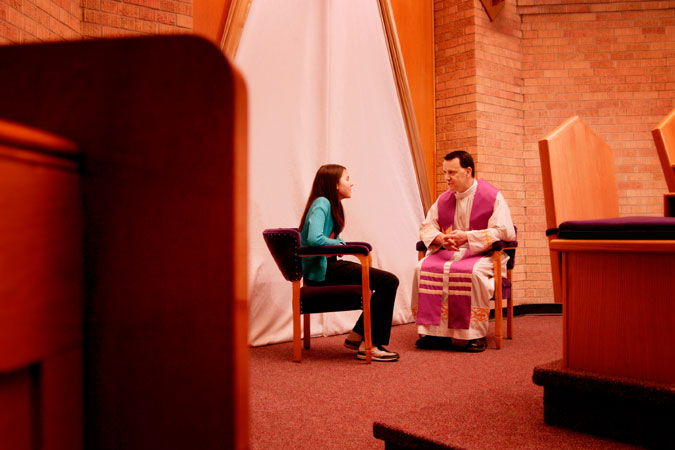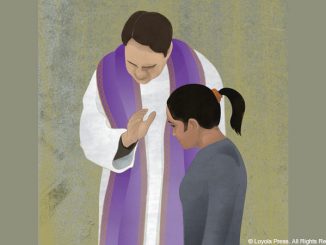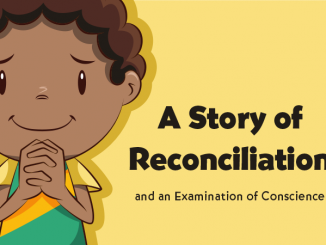
“But why do I have to tell my sins to a priest? Can’t I just go directly to God?”
This time it’s the Confirmation students asking the question. And yes, you can pray directly to God, and God has already forgiven our sins through the Death and Resurrection of Jesus Christ. But perhaps we have missed the point of sacramental Reconciliation. As catechetical leaders, it is our responsibility to meet people where they are and lead them gently to a new place on their personal faith journey. Coming to the Lord in the Sacrament of Reconciliation with an open heart and willing spirit can be instrumental in moving forward. As I prepare to meet with the parents of the second graders who will be receiving this Sacrament of Healing for the first time, I know the question will arise again. So what can I do for these parents, for their children, and for the Confirmation students that may stir in them a desire to meet the Lord in this sacrament?
Discussion of the Sacrament of Reconciliation at a Parent Meeting
I find it helpful to begin with a nonthreatening exploration of their personal attitudes and beliefs regarding the Catholic Church in general and the Sacrament of Reconciliation in particular. I use a very simple reflection sheet that asks each person to privately reflect on five questions:
- What is your attitude toward the Church?
- What feelings are evoked when thinking about confession?
- How would you describe sin?
- By what means do you reflect on your own conscience formation?
- In what way have you experienced forgiveness most intensely?
After everyone has had an opportunity to think about the issue, I invite sharing within the group. It also helps for me to reflect on whether or not my own attitudes and beliefs have changed since the last time I held this meeting! Then we pray together, asking for open hearts and minds as we approach this sacrament with our children.
A Scripture reading and a brief presentation breaking open the Word of God follows, providing some biblical and theological background. Two of my favorite stories are the healing of the paralytic (Mark 2) and the healing of the woman healed of hemorrhages (Mark 5). In both passages we have the opportunity to explore several important points:
- We acknowledge our belief that our God is a loving, merciful, and forgiving God, and we are all in need of healing. The woman cured recognized that she was sick, that nothing she could do would cure her, and that Jesus has the power to heal her. The paralytic and his friends recognized the importance of a personal encounter with Jesus. The emphasis is not on the sickness but on the healing. What happens in sacramental Reconciliation is no less miraculous than what happened to the paralytic or the woman. Jesus heals us of our brokenness. Do you believe Jesus can heal you?
- We acknowledge our need to recognize, name, and confess our sins. If we cannot think of what it is we’ve done that offends God, or we never take the time to do so, we need to take a closer look at our relationship with God. We are all sinners. There is a real need for us not only to acknowledge our sinfulness, but to name our sins so we can work towards overcoming them. In order to grow closer to God, we need to recognize what it is that is keeping us away from God. Sacramental Reconciliation provides the opportunity for us to identify our sin, name it, repent of it, and seek forgiveness for it. Only then can we move forward.
- We acknowledge our belief in the communal nature of the Body of Christ and the role of the Church in leading and guiding God’s people. Our communal celebrations of the sacraments witness to our reliance on the whole Body of Christ as we make our way through this life. We are not in this alone. And we recognize that our sinfulness not only affects our personal relationship with God, but it affects our relationships with our brothers and sisters. Celebrating communally the presence of God in our brokenness and in our healing, we are strengthened to move forward together.
Finally, we return to the first question, “Why must I confess my sins to a priest?” Instead of asking this question, I invite parents and students to think instead about why participating in the Sacrament of Reconciliation might be valuable for their own spiritual journey. How might we adjust our attitudes toward this sacrament? How can we develop habits of examining our consciences, forming virtuous hearts, and strengthening our relationships with God and neighbor? And how can we foster positive, healthy attitudes in our children?
As we approach the Sacrament of Reconciliation, we must be aware of the perceptions, attitudes, and feelings we have toward the Church and sacraments. We must have opportunities to reflect on our own relationship with Christ. Learning to be a forgiving person and learning to approach God and others for forgiveness are necessary aspects of Christian life and must take place in every dimension of our lives.
What else would you include in a parent meeting or conversation about the Sacrament of Reconciliation?




Leave a Reply